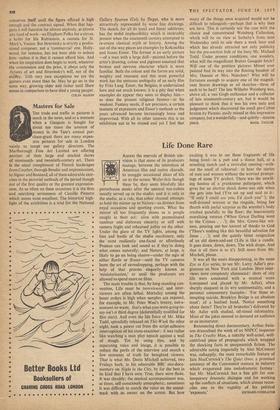Life Done Rare
AMONG the marvels of British tele- vision is that some of its producers manage, between the interstices of American film and native charade, to smuggle occasional slices of life
„ on to the screen. Wafer-thin though these be, they seem blissfully like porterhouse steaks after the spectral nut-cutlets usually served up in the studio; and it is only in the studio, as a rule, that either channel attempts to hold the mirror up to Nature—as distinct from royal occasions and sporting events. What the mirror all too frequently shows us is people caught in their act : alive with premeditated candour and elaborate sincerity or stiff with camera fright and rehearsed jollity on the other. Under the glare of the TV lights, among the fuss and bustle of the studio machinery, only the most resiliently one-faced or effortlessly Protean can look and sound as if they're doing what comes naturally; and Nature, at large, is likely to go on being elusive—under the mgis of either fforde or ffraser—until the TV cameras learn the art of eavesdropping, perhaps with the help of that process elegantly known as 'miniaturisation,' or until the producers are allowed to spend more on films.
The main trouble is that, by long-standing con- vention, Life must be interviewed; and inter- viewers are often lethal. Mortality among the lesser orders is high when samples are exposed, for example, to Mr. Peter West's breezy, not-a- moment-to-waste, that's-what-you-were-going-to- say-isn't-it third degree (deferentially modified for film stars). And even the life force of Mr. Mike Todd, splendidly released on This Week the other night, took a power cut from the script-adhesive interrogation of his cross-examiner : it was rather like watching a man play squash against a wall of dough. Yet by using film, and by separating voice and image, it is possible to reduce the perils of the interview and snatch a few moments of truth for benighted viewers. That is what Mr. Denis Mitchell achieved, two Fridays back, in his admirable BBC neo-docu- mentary on Night in the City, by far the best in its kind that I have seen. True, there were flaws. It was shreddy; the musical accompaniment was, at times, self-consciously atmospheric; sometimes it was difficult to match the voice on the sound- track with. its owner on the screen. But how exciting it was to see these fragments of life being lived—in a pub and a dance hall, at a wrestling match and a revivalist meeting—with- out the smell of rehearsal : to hear the stories of men and women without the worried prompt- ings of some TV prefect. There was the unwill- ing hostess of a pranksome poltergeist, which gives her an electric shock down one side when she gets into bed (Tye sat up and said to it : "If only I could see you, I'd slosh you" '); the well-dressed woman at the ringside, biting her thumb with joyful surprise as the wrestler's body crashed painfully to the floor; the inaccurately moralising veteran ('When Grace Darling went to the Crimea . . .'); the Mrs. Grove-like wit- ness, pouring out her torrent of thanks to God ('There's nothing like this beautiful salvation for Jesus . . .'); and the quietly bitter resignation of an old down-and-out Mae is like a candle. It goes down, down, down. The wick drops. And that is all there is to it'). Still more from Mr. Mitchell, please.
It was all the more disappointing, in the same Eye to Eye series, to see Mr. Larry Adler's pro- gramme on New York and London. Here inter- views were completely eliminated : shots of city life were annotated with a musical score (composed and played by Mr. Adler), often sharply eloquent in its wry sentimentality, and a personal commentary (samples : 'For those at- tempting suicide, Brooklyn Bridge is an absolute must'; of a busbied band, 'Notice something about them? They're all brunettes') delivered by Mr. Adler with studied, off-timed informality. Most of the jokes seemed to demand an audience or an incinerator.
Renouncing direct documentary, Arthur Swin- son dramatised the work of an NSPCC inspector in The Cruelty Man, a notably well-acted, well- contrived piece of propaganda which wrapped the shocking facts in unsqueamish fiction. The admirable acting (especially by Alec McCowen) was, unhappily, the most remarkable feature of lain MacCormick's The Quiet Ones, a promised anatomy of the Communist menace in industry which evaporated into melodramatic fantasy : but Mr. MacCormick has a fine gift for con- temporary dramatic dialogue and for working up the conflicts of situations, which almost recon- ciles one to the vapidity of his political


































 Previous page
Previous page